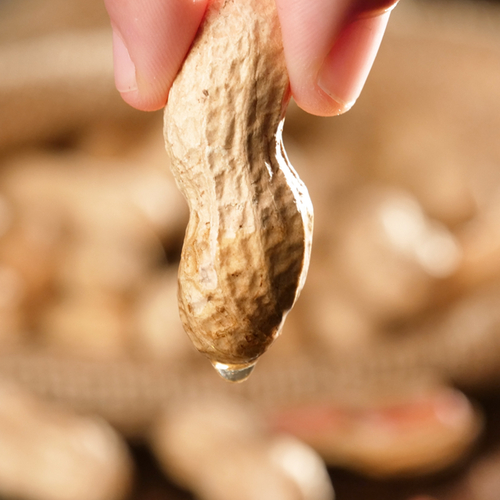
Peanut oil
Scientific names: Arachis hypogaea
Family: Fabaceae/Leguminosae
Alternate names: Aceite de Cacahuete, Aceite de Maní, Arachide, Cacahouète, Cacahuète, Earth-Nut, Groundnuts, Huile d'Arachide, Huile de Cacahouète, Huile de Cacahuète, Monkey Nuts, Peanut, Peanuts
Background
Peanut oil is the oil from the seed (peanut) of the peanut plant (Arachis hypogaea). Peanut oil is used in cooking and is also used to make medicine.
Peanut oil is high in monounsaturated "good" fat and low in saturated "bad" fat. This is believed to help prevent heart disease and lower cholesterol. Peanut oil might help to reduce fatty build up in blood vessels.
People use peanut oil for high levels of cholesterol or other fats in the blood, heart disease, joint pain, dry skin, and many other conditions, but there is no good scientific evidence to support these uses.
Peanut is considered a major food allergen in the US. Peanut contents, including peanut oil, must be labeled on packaged food and supplement products.
Peanut oil is high in monounsaturated "good" fat and low in saturated "bad" fat. This is believed to help prevent heart disease and lower cholesterol. Peanut oil might help to reduce fatty build up in blood vessels.
People use peanut oil for high levels of cholesterol or other fats in the blood, heart disease, joint pain, dry skin, and many other conditions, but there is no good scientific evidence to support these uses.
Peanut is considered a major food allergen in the US. Peanut contents, including peanut oil, must be labeled on packaged food and supplement products.
Safety Safety definitions
When taken by mouth: Peanut oil is commonly consumed in foods. But there isn't enough reliable information to know if peanut oil is safe to use in larger amounts as medicine. Peanut oil can cause allergic reactions in people who have an allergy to peanut.
When applied to the skin: Peanut oil is likely safe. But peanut oil can cause allergic reactions in people who have an allergy to peanut.
When given as an enema (rectally): There isn't enough reliable information to know if peanut oil is safe to use or what the side effects might be.
Allergy to peanuts, soybeans, and related plants: Peanut oil can cause serious allergic reactions in people who are allergic to peanuts, soybeans, and other members of the Fabaceae plant family.
When applied to the skin: Peanut oil is likely safe. But peanut oil can cause allergic reactions in people who have an allergy to peanut.
When given as an enema (rectally): There isn't enough reliable information to know if peanut oil is safe to use or what the side effects might be.
Special Precautions & Warnings:
Pregnancy and breast-feeding: Peanut oil is commonly consumed in foods. There isn't enough reliable information to know if peanut oil is safe to use in greater amounts as medicine while pregnant or breast-feeding. Stay on the safe side and stick to food amounts.Allergy to peanuts, soybeans, and related plants: Peanut oil can cause serious allergic reactions in people who are allergic to peanuts, soybeans, and other members of the Fabaceae plant family.
Effectiveness
Effective Effectiveness definitions
There is interest in using peanut oil for a number of purposes, but there isn't enough reliable information to say whether it might be helpful.
Dosing & administration
Peanut oil is commonly used in foods. As medicine, there isn't enough reliable information to know what an appropriate dose of peanut oil might be. Keep in mind that natural products are not always necessarily safe and dosages can be important. Be sure to follow relevant directions on product labels and consult a healthcare professional before using.
Interactions with pharmaceuticals
It is not known if Peanut Oil interacts with any medicines. Before taking Peanut Oil, talk with your healthcare professional if you take any medications.
Interactions with herbs & supplements
There are no known interactions with herbs and supplements.
Interactions with foods
There are no known interactions with foods.
vital.ly has licensed monographs from TRC Healthcare.
This monograph was last reviewed on 31/05/2023 10:00:00 and last updated on 24/12/2012 22:17:20. Monographs are reviewed and/or updated multiple times per month and at least once per year.
Natural Medicines disclaims any responsibility related to medical consequences of using any medical product. Effort is made to ensure that the information contained in this monograph is accurate at the time it was published. Consumers and medical professionals who consult this monograph are cautioned that any medical or product related decision is the sole responsibility of the consumer and/or the health care professional. A legal License Agreement sets limitations on downloading, storing, or printing content from this Database. No reproduction of this monograph or any content from this Database is permitted without written permission from the publisher. It is unlawful to download, store, or distribute content from this site.




